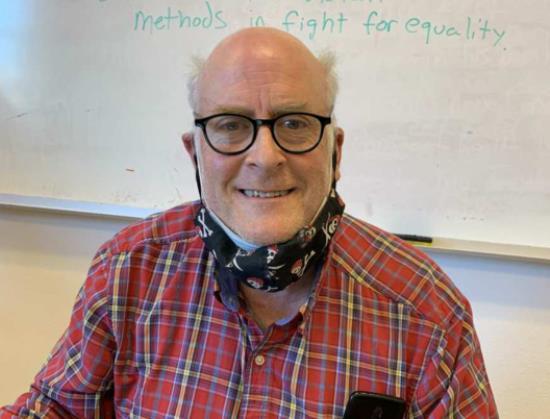Oral Traditions – Passing Stories Onward to Future Generations
The family story goes that my Uncle Jack, when he was about 15, received a shotgun one Christmas in the mid-1940s. With a look of glee, he grabbed it, pointed it upward and blasted a giant hole in the ceiling of the Sanders family home in Alexandria, Virginia.
It definitely was not funny at the time and my grandpop and Nannie probably wanted to strangle Jack. But as years went by it became a funny family story that my dad, Jack’s younger sibling, loved to tell. Jack, my dad would explain, had not known the gun was loaded.
This family memory is an example of `Oral Tradition,’ which my classes of GHS 11th graders have studied recently in Language Arts. Renowned writer Leslie Marmon Silko (1948-present), raised in Laguna Pueblo, made a career writing about the Oral Traditions of her Native American culture and family. She grew up listening to tribal stories from her older family members. She would, throughout her prolific writing career, include these cultural and family stories into her vast foray of poetry, fiction novels, and essays. She’s known best as a storyteller.
Silko once said, “The Oral Tradition is a collective memory and depends upon the whole community. My earliest memories are of my grandmother telling me stories while she watered the morning-glories in her yard.”
Oral Tradition is the passing on of stories or family cultural elements from generation to generation by word of mouth and writing. This can also be achieved through memoirs, video tape interviews, recordings, music, and from a person’s firsthand knowledge of events.
We, in Cibola County, have a wonderful mixture of various ethnic cultures – Native Americans (Acoma, Navajo, Laguna), Hispanics, Caucasians, and others. We, as individuals, are blessed to have both family and ethnic cultures. But it’s vital we share our Oral Traditions with our future generations, just as we have grown up learning the ways, customs, stories of our own people.
I have students who have had rough upbringings that have harbored bitterness and anger in their hearts. They, perhaps, do not feel connected to their respective cultures or families as a result. I tell these students, `Try to find some good memories from your past, and when you become a parent one day, do better in making your children’s lives happier than what you experienced. Start your own wonderful `Oral Traditions’ and one day your kids will pass those on to their kids.”
A beloved family member of mine learned in her late 30’s her parents were not, in fact, her real parents. She had searched the internet and learned this truth. It set her spiraling for several years and almost broke up her marriage. She was lost, disconnected and in need of finding out who she was. The parents who had raised her were loving but had put off telling her the truth. Ultimately, she connected with her true blood parents and her heart eventually healed.
We, as people and cultures, need to know our roots. It’s part of who we are. Without that knowledge we are like lost souls.
Some Oral Traditions I have been blessed with include: my gold cast wedding ring my dad once wore and passed on to me when I got engaged; a silver bracelet with baseball charms attached – a gift my mother received long ago for her duties as Little League `Team Mother’ for the Vienna, Virginia Major Braves I played for; memories of my parents, on weekend evenings, turning on the turntable and playing records by the Carpenters, Glen Campbell, and Tony Bennett.
You see, even good memories can be a part of Oral Tradition. My hopes are for all members of our great community to have positive Oral Traditions, both keepsakes or memories, they can pass on to the next generation.

